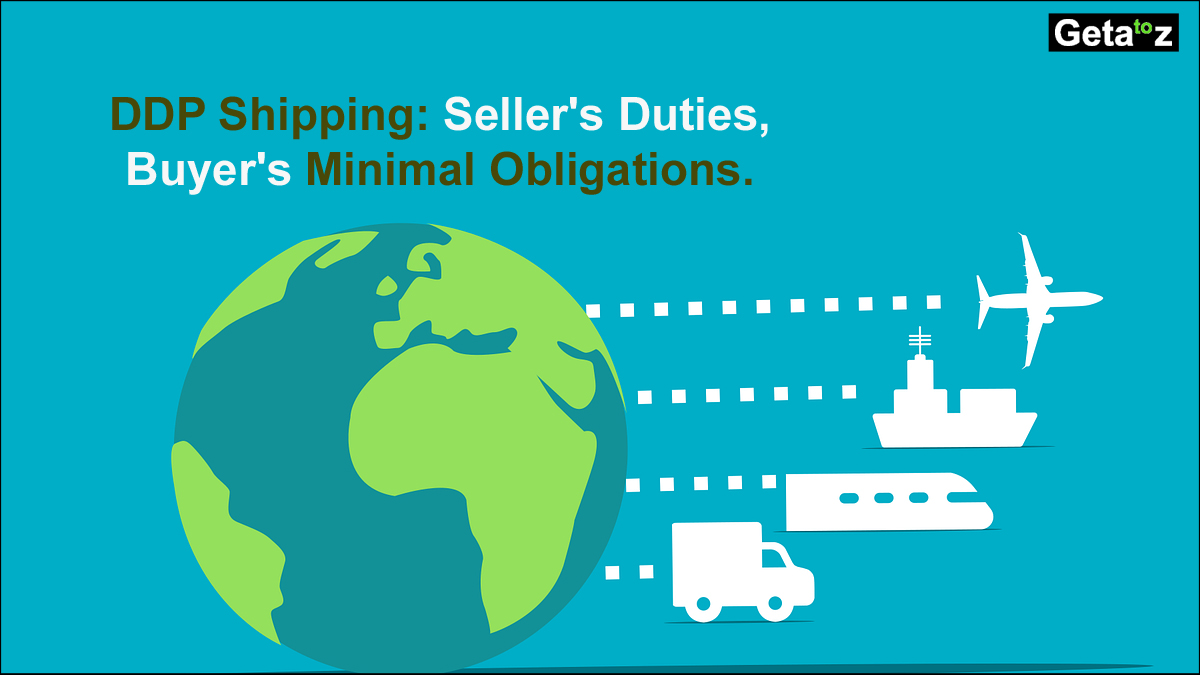DDP Shipping Demystified: A Buyer’s and Seller’s Guide
Updated: June 20, 2024

A Delivered Duty Paid (DDP) shipping agreement is an Incoterm that places the maximum obligations on the seller and the minimum obligations on the buyer.
The seller has to pay the import duties, including inland transportation from the import point to the buyer’s premises, to deliver the goods to the destination in the buyer’s country in a Delivered Duty Paid (DDP) arrangement. The seller pays all costs, including import duties, taxes, and any other charges related to delivery, cleared for import. The place of destination should be mentioned in the DDP agreement.
Responsibility of the Seller
DDP means the seller has the most responsibility, while EXW (Ex Works) means the seller has the least responsibility. So, in DDP, the seller takes on all the costs, risks, and responsibilities. The seller is responsible for the goods until they reach the buyer’s location. They provide door-to-door delivery and handle customs clearance at export and import ports. The seller must also get import licenses, permits, or certain payment options with Customs. Suppose the seller can’t get an import license. In that case, they should use the DDU (Delivered Duty Unpaid) term instead of DDP (Delivered Duty Paid).
In simpler terms, think of DDP like ordering a pizza. If you choose DDP, the pizza place does everything for you. They make the pizza, drive it to your house, and even make sure they have permission to drive in your neighborhood.
But if the seller can’t get the permission (like an import license), they have to use a different plan, like DDU. This is like the pizza place saying they can do everything except get permission to enter your neighborhood, so you might need to help with that part.
Responsibility of the Buyer
The buyer has few responsibilities in a Delivered Duty Paid (DDP) shipping agreement. The buyer’s main job is to unload the goods at the agreed place and then move them to their final destination. The buyer does not have to worry about risks or help the seller with import paperwork or other documents during shipping. The seller takes care of all these tasks, making it easy and hassle-free for the buyer.
Benefits to the Seller
The seller has several advantages in a Delivered Duty Paid (DDP) shipping agreement. First, the seller controls all the shipping costs and can adjust them to make the most profit. This means they can choose the cheapest or most efficient ways to ship the goods. Second, the seller can pick the shipping service that gives them the best deal or the biggest commission. These benefits help the seller save money and earn more. The buyer, however, does not get these same benefits.
Benefits to the Buyer
Delivered Duty Paid (DDP) benefits buyers, especially if they are inexperienced or busy. In a DDP agreement, the seller takes care of almost everything. The seller handles the shipping, paperwork, and any other tasks. This means the buyer doesn’t have to worry about these details. The buyer must prepare to sell or use the products when they arrive. This makes things easy and stress-free for the buyer, as they don’t have to deal with problems until the goods are delivered.
Comparison of DDP to DAP
Delivered At Point (DAP) and Delivered Duty Paid (DDP) are two ways to ship goods internationally. They differ mainly in who handles customs and pays for import duties and taxes.
Under DAP, the buyer must handle customs clearance and pay duties and taxes. The buyer is responsible for dealing with all the paperwork and extra costs when the goods arrive.
On the other hand, under DDP, the seller takes care of everything. The seller clears the goods through customs and pays all the import duties and taxes. This makes it easier for the buyer because they don’t have to deal with any paperwork or extra costs when the goods arrive.
DAP is often better when there are no complicated customs procedures. However, with many customs rules and paperwork, DDP is more convenient because the seller handles all the details.
Considerations for Importers and Exporters
A Delivered Duty Paid (DDP) shipping agreement is great for buyers who want a hassle-free experience and don’t know much about shipping. It’s also good for sellers because they can control all the costs and possibly make more profit.
Experienced buyers usually avoid DDP. They often have cheaper ways to import their goods because they know more about shipping. These companies often have a network of reliable agents who can handle their shipping needs.
DDP is best for buyers who don’t import often or haven’t built these relationships yet. It’s the easiest way for them to get their goods without trouble. DDP is not usually recommended for ocean shipping. It’s more common and makes sense for parcel shipping or air express.
To sum up, a Delivered Duty Paid (DDP) shipping agreement offers buyers a seamless and worry-free experience by transferring all the shipping responsibilities and risks to the seller. While this arrangement can be advantageous for sellers who control the costs and logistics, it is particularly beneficial for buyers who may lack the expertise or resources to handle international shipping complexities. However, it’s essential for both parties to carefully consider their specific needs, experience, and cost implications before choosing DDP or any other shipping terms. Whether you’re a buyer seeking convenience or a seller aiming to control the logistics process, understanding the nuances of DDP can help you make informed decisions and ensure smooth international transactions.